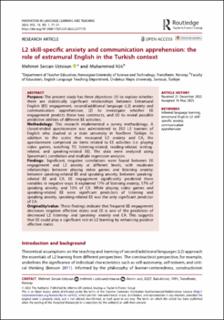| dc.contributor.author | Uztosun, Mehmet Sercan | |
| dc.contributor.author | Kok, Muhammed | |
| dc.date.accessioned | 2024-04-16T11:25:59Z | |
| dc.date.available | 2024-04-16T11:25:59Z | |
| dc.date.created | 2023-05-30T11:26:31Z | |
| dc.date.issued | 2023 | |
| dc.identifier.citation | Innovation in Language Learning and Teaching. 2023, 18 (1), 17-31. | en_US |
| dc.identifier.issn | 1750-1229 | |
| dc.identifier.uri | https://hdl.handle.net/11250/3126790 | |
| dc.description.abstract | Purpose: The present study has three objectives: (1) to explore whether there are statistically significant relationships between Extramural English (EE) engagement, second/additional language (L2) anxiety and communication apprehension, (2) to investigate whether EE engagement predicts these two constructs, and (3) to reveal possible predictive abilities of different EE activities.
Methodology: This research implemented a survey methodology. A closed-ended questionnaire was administered to 252 L2 learners of English who studied at a state university in Northern Türkiye. In addition to the scales that measured L2 anxiety and CA, the questionnaire comprised six items related to EE activities (i.e. playing video games, watching TV, listening-related, reading-related, writing-related, and speaking-related EE). The data were analysed using Spearman’s correlation and multiple regression analyses.
Findings: Significant, negative correlations were found between EE engagement and L2 anxiety at different levels, with moderate relationships between playing video games and listening anxiety; between speaking-related EE and speaking anxiety; between speaking-related EE and CA. EE engagement significantly predicted three variables in negative ways: it explained 17% of listening anxiety, 17% of speaking anxiety, and 15% of CA. While playing video games and speaking-related EE were significant predictors of listening and speaking anxiety, speaking-related EE was the only significant predictor of CA.
Originality/value: These findings indicate that frequent EE engagement decreases negative affective states and EE is one of the predictors of decreased L2 listening- and speaking- anxiety and CA. This suggests that EE could play a significant role in L2 learning by enhancing positive affective states. | en_US |
| dc.language.iso | eng | en_US |
| dc.publisher | Taylor & Francis | en_US |
| dc.rights | Attribution-NonCommercial-NoDerivatives 4.0 Internasjonal | * |
| dc.rights.uri | http://creativecommons.org/licenses/by-nc-nd/4.0/deed.no | * |
| dc.title | L2 skill-specific anxiety and communication apprehension: the role of extramural English in the Turkish context | en_US |
| dc.title.alternative | L2 skill-specific anxiety and communication apprehension: the role of extramural English in the Turkish context | en_US |
| dc.type | Journal article | en_US |
| dc.type | Peer reviewed | en_US |
| dc.description.version | publishedVersion | en_US |
| dc.source.pagenumber | 17-31 | en_US |
| dc.source.volume | 18 | en_US |
| dc.source.journal | Innovation in Language Learning and Teaching | en_US |
| dc.source.issue | 1 | en_US |
| dc.identifier.doi | 10.1080/17501229.2023.2217170 | |
| dc.identifier.cristin | 2150117 | |
| cristin.ispublished | true | |
| cristin.fulltext | original | |
| cristin.qualitycode | 1 | |

